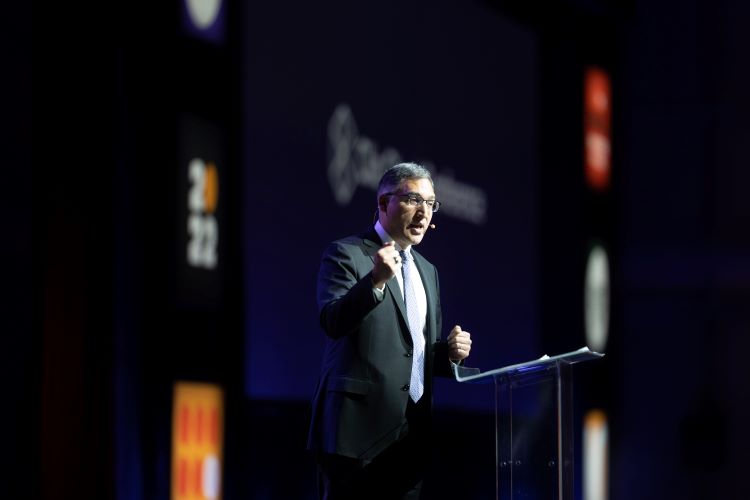Neal Katyal discusses SCOTUS highs and lows at Clio conference

Neal Katyal, a former acting U.S. solicitor general, speaks at the 2022 Clio Cloud Conference on Oct. 11. Photo courtesy of Clio.
Speaking Tuesday at the Clio Cloud Conference, former Acting U.S. Solicitor General Neal Katyal gave attendees an intimate glimpse at what it’s like arguing cases in front of the U.S. Supreme Court.
“When I argue, the podium is about eight feet away from the chief justice. So he sees everything. He sees you sweat,” Katyal said. “It’s a humbling thing.”
Katyal, a partner at the Washington, D.C., office of Hogan Lovells, gave the morning address on the second and final day of the conference in Nashville, Tennessee. And he spoke about some of his biggest wins and losses.
He also addressed some of the Supreme Court’s most recent decisions, noting that it had “interjected itself into a lot of aspects of our lives.”
This year, the court overturned Roe v. Wade with Dobbs v. Jackson Women’s Health Organization, expanded the right to carry firearms in public, and limited the Environment Protection Agency’s power to regulate carbon emissions.
“There is concern about where the court is going, and that is something we should take seriously,” Katyal said, adding later that some of the court’s decisions are “out of the mainstream of where American society is.”
According to his firm bio, Katyal has argued more cases than any other minority lawyer at the Supreme Court, including Thurgood Marshall. And as he spoke at the Gaylord Opryland Resort & Convention Center, he took attendees back to his first case there.
Katyal got his first win in 2006 in the case Hamdan v. Rumsfeld when he defended Osama bin Laden’s former driver Salim Ahmed Hamdan in a case challenging George W. Bush’s military tribunals.
The lawyer said he was so nervous about appearing before the Supreme Court he hired an acting coach to rehearse his argument. The first thing the coach did was have him put the legal pad he was reading from to one side. The second thing he did was have him hold his hand.
“‘This is weird,’” Katyal said to laughter. “But I realized that’s actually the right way to do it. I realized persuasion is about communication. The speakers who come to the court with all their bravado, confidence and stuff, I don’t think they get very far.”
On the day of the argument, Katyal said he was “nervous as heck” but took the lessons into the court with him to persuade the majority of justices.
“I’m mentally holding the justices’ hands while they’re asking the questions. And it’s so much more relaxed,” Katyal said. “And the truth is, I won this thing.”
He lives with the losses too. Katyal argued against President Donald Trump’s travel ban against several majority Muslim countries, but in 2018, the court narrowly ruled in favor of Trump.
“I remember being devastated when that decision came down. And it was hard to get up after that,” Katyal said.
He said the ruling did have a bright spot. The opinion had the effect of overturning Korematsu v. United States, a 1944 opinion that led to the internment of Japanese Americans during World War II. And he said the ruling also reminded him of the role of advocacy in the courts.
“It’s great to win a case, obviously,” Katyal said. “But it’s really important to set markers on what’s right and wrong.”
During a brief question and answer session at the end, Katyal also said he believes that expanding the Supreme Court is unlikely to happen because it would take 60 votes in the Senate or the abolition of the filibuster.
“I just don’t think it’s realistic. It seems to me not a productive use of time,” Katyal said. “I’m generally a believer in the judicial system in the United States, and the fact that it’s worked over the centuries. So, I’m always worried about tinkering with it.”



